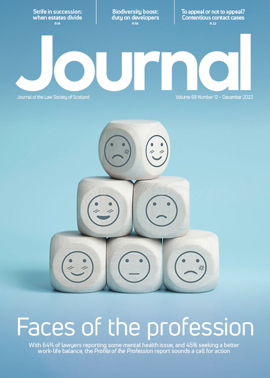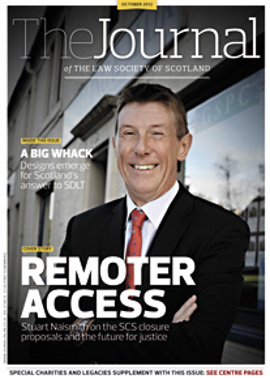Charity begins at law
Supplement
Journal readers will be familiar with the lengths to which many firms go to operate a meaningful corporate social responsibility policy and to support staff to volunteer for worthy causes or participate in charitable fundraising. But while a lucky few get to walk the Great Wall of China, or throw themselves out of an aeroplane, when it comes to really making a difference to Scottish society and beyond, just what might be the most effective role a lawyer can play?
“Third sector” is the blanket term used to include voluntary organisations, social enterprises and community groups. Many third sector organisations are charities, and many deliver services through volunteers, but all of them, regardless of legal form, will be governed by a board composed of volunteers. Depending on the size and shape of an organisation, alongside the inspiring challenges such as strategic planning and improving services, these volunteer board members can end up dealing with a bewildering array of complex issues and thorny problems, few of which are glamorous, few of which are simple.
Land and property deals, contracts to deliver service, contracts of employment, grant conditions, risk assessment: the list goes on and on. Consequently, it is unsurprising that it is often much harder to get people to volunteer to join a board than it is to get them to volunteer at the front line.
What these volunteers need is help, and that is why a few years ago a trio of firms got together with the Scottish Council for Voluntary Organisations (SCVO), the main representative body for Scotland’s third sector, to make a difference to people’s lives in a less glamorous but no less essential way than their abseiling or skydiving colleagues.
Collective help
Harper Macleod, Lindsays and MacRoberts are partners in the SCVO Free Legal Advice Service. The service is open to SCVO members with an income of less than £500,000. More than 80% of Scotland’s voluntary organisations have an income of less than £100,000, with 68% on less than £25,000, so the scope for the sector to take advantage of the service is substantial. Many SCVO members are charities and many are small local community groups.
These members can access up to two free hours of confidential advice by lodging their enquiry with the SCVO helpline in the first instance. After taking some details, helpline staff pass enquiries to one of the firms. Should further advice be required, an agreed rate applies across all three firms. This ensures both affordable access and, since it is allocated among the three firms on the “cab rank” principle, distributes work more equitably. The promised response time is within five days, but a recent SCVO survey showed that most members get a response within two or three. All users rated the service as “good” or “excellent”, and all would recommend it to others.
The service was set up to focus on the areas of law most relevant to the voluntary sector: governance, contracting, employment, property, and intellectual property. Data on enquiries gives a good insight into the main areas of concern, with a fairly even split across the first four and a small number of IP and “other” queries. Latest figures show that governance issues (read charity and company law) are coming to dominate, now comprising almost a third of enquiries, but helpline staff report anecdotally that employment queries are rising, perhaps not surprisingly given the current economic climate. Seminars on the basics of these areas of law and recent developments in them are also part of the service.
Diverse needs
Alistair Keatinge, Head of Charities at Lindsays, believes there are clear benefits for both SCVO members and the firms involved.
“The way the scheme is structured enables smaller organisations to access experts in three leading firms. Coming to us via the SCVO helpline assists enquirers to really focus their enquiry, which helps us provide the right advice more quickly. As a firm, Lindsays has found a number of benefits of being a participant in the scheme. It makes us very aware of the issues that are most impacting on not-for-profit organisations, particularly those who may not otherwise be financially able to contact professional advisers. We have learnt a lot about the practical issues associated with governance and staff/board relations that can hold an organisation back. The more we know about the context, the better our advice will be.
“In one case, a charity merger was publicly announced by a local authority prior to the conclusion of the merger discussions and the completion of due diligence. We stepped in to ensure the merger could take place on appropriate terms and supported the board members to confidently raise and address some difficult legal issues with the local authority, including those around governance, which they had previously not felt confident or knowledgeable enough to do.”
Harper Macleod recently provided advice on a highly complex charity reorganisation, enabling a more effective use of the resources available to local voluntary sector groups. Ruth McNaught, solicitor in Harper Macleod’s Public Sector & Social Housing Department, says that working with SCVO’s members allows the firm to become involved with a broad range of work.
“From grassroots organisations looking for help in establishing themselves, to more established charities looking for help in documenting a fundraising arrangement, to charities wishing to end their operations, we are involved with voluntary organisations throughout their lives. And by supporting those who support others, the firm and the people within it are able to give something back to communities across Scotland.”
Robin Fallas, associate with MacRoberts’ Charities, Public Sector, Government & Third Sector team, is also convinced of the value of the service.
He says: “The work is very varied, so we learn a lot and we revise our approach using the customer feedback gathered by SCVO. The people who come to us get expert advice from lawyers who know the voluntary sector and who specialise in the issues that most affect it. We’ve recently supported a small rural charity to negotiate its lease, we’ve provided advice on payment of rates, and we give a lot of advice on changes to articles of association and on other constitutional issues, including becoming a Scottish charitable incorporated organisation.”
A parent member of one Edinburgh after-school club testified to the value of the help received: “We were a bit worried that our constitution was out of date and that we weren’t running things as we should have been. Robin helped us understand what we needed to change. I guess it may have been a pretty easy piece of work for him but it was a weight off our minds. With the best will in the world, most folk don’t get involved in their community for the fun of dealing with the legal paperwork.”
Other avenues
Of course, this service is not the only way that lawyers help charities in a more structured manner. Initiatives such as the National Free Wills Network involve private client lawyers, and funders of charities such as Inspiring Scotland include free legal advice as part of their investment package. Building on their current partnership work, Harper Macleod will also deliver SCVO’s human resources and employment support service, which will assist members to develop robust approaches to these areas of their activity.
While not every lawyer or firm can be involved in external services like these, any lawyer can become a volunteer board member, and doing so can be of incalculable value to the organisation, as well as a fantastic experience both legally and personally. It is said that “the fish rots from the head”, and getting it right at board level really can mean life or death for a third sector organisation. So, however it’s done, supporting organisations to make a difference to the lives of people up and down Scotland by supporting boards means lawyers can make – and are making – a difference to those people’s lives too.
Find out more at
- www.scvo.org.uk/membership/exclusive-benefits/free-legal-advice
- www.inspiringscotland.org.uk
- www.volunteerscotland.org.uk
- www.nationalfreewills.net
In this issue
- Players and winners
- Access to client money?
- Tax and residential property
- Trusts and the family business
- Planning: the next level
- Reading for pleasure
- Opinion: Tom Mullen/Alan Paterson
- Council profile
- Book reviews
- President's column
- Deed plan criteria
- Decision time for justice
- "Can do": can you?
- Taxes heading north
- When the agent answers
- Taking care of child cases
- Collective redress
- Making sense of hearsay rules
- Don't forget the register
- Alcohol: the healthy option
- Seeding scheme is a draw
- Scottish Solicitors' Discipline Tribunal
- Human trafficking: is the system responding?
- Power points and positive rights
- A way to apply yourself
- Society presents "ambitious plans"
- Law reform roundup
- Business benefits
- On the right track
- Ask Ash
- Business radar
- Legacies: the untapped potential
- Charity begins at law
- Love them and leave to them
- Those difficult relatives






